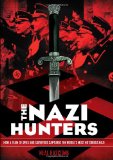
 The Nazi Hunters
The Nazi HuntersHow a Team of Spies and Survivors Captured the World's Most Notorious Nazi
Arthur A. Levine Books (Scholastic), 2013. 242 pages.
Starred Review
2014 YALSA Excellence in Nonfiction Award Winner
Here's a work of nonfiction that reads like a thriller. I didn't realize until I read the note about the author at the back that this book was based on the author's book for adults, Hunting Eichmann. It doesn't read like an abridgement.
Because of the nature of the material, this is a book for teens and preteens, rather than children. But anyone who enjoys a good spy novel will enjoy this true-life tale.
The book sets the stage with what happened in World War II. It looks at the particular, focusing on the story of a young man, Zeev Sapir, in Hungary. Zeev later testified at Eichmann's trial. The book explains the four phases of Eichmann's plan: Isolate the Jews, secure Jewish wealth, move the Jews to ghettos, and finally, transport them to camps. His job was to get them to the camps, and he didn't claim responsibility for what happened to them there.
The first chapter briefly explains Eichmann's rise to power and his escape from Germany at the end of the war. The rest of the book focuses on how he was discovered in Argentina by Israeli Secret Service, and the elaborate plan they needed to be able to abduct him, bring him to Israel, and put him on trial.
I was struck by the sheer number of those involved who had lost family members in the Holocaust. I shouldn't have been surprised, but the details as mentioned in this book brought it home to me.
I like the way the book explains the importance of the trial of Adolf Eichmann:
The Eichmann trial was almost more important in the field of education than in that of justice. David Ben-Gurion achieved his ambition: The trial educated the Israeli public, particularly the young, about the true nature of the Holocaust. And, after sixteen years of silence, it allowed survivors to openly share their experiences.
In the rest of the world, the intense media coverage and the wave of Eichmann biographies and fantastic accounts of his capture rooted the Holocaust in the collective cultural consciousness. The Shoah, as it was also known, was not to be forgotten, and an outpouring of survivor memoirs, scholarly works, plays, novels, documentaries, paintings, museum exhibits, and films followed in the wake of the trial and still continues today. This consciousness, in Israel and throughout the world, is the enduring legacy of the operation to capture Adolf Eichmann.
The book is full of photographs all along the way, including pictures of important documents, such as the captain's logbook for the El Al flight out of Argentina and Eichmann's Red Cross passport. This reminds the reader, all the way through, that these exciting events actually took place.
